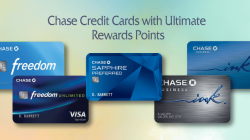This post is a bit of a soapbox, but several recent comments and notes from others have had me thinking. Back during the Chicago Seminars, we bloggers were up in front and were asked a question as to how we approach credit cards, maximizing our points and cardholder benefits. I have a confession that some of you have already picked up on: I am a very lazy card churner. In fact, I’m lazy altogether when it comes to credit cards.
I know, I know, any friends or family reading this may wonder what I’m talking about but hear me out. I have well over a dozen open credit card accounts, but I only carry one of them on a regular basis: the Chase Sapphire Preferred. The Hyatt Visa comes out only when I’m booking a hotel room. The United Club Visa only when I’m renting a car. The SPG Business American Express card only because I’m trying to reach minimum spend. The 5X trick of buying pre-paid cards with your Ink Bold or Ink Plus business card? I think I’ve bought about $2,000 total over six months… and that was six months ago. Yet I pass an Office Depot every day on my way to work! And there’s no Vanilla Reload shortage here in Seattle.
If I were Mr. Deals, I think Mrs. DealsWeLike would have killed me by now. And Megan is even worse than I am.
The fact is, I started this whole travel game because I hate inconveniences. Elite status helps me skip the lines and those annoying fees. It doesn’t matter that I still try to arrive super early or that the mileage runs cost more than the fees. It’s the principle. I don’t want to deal with them. I have never paid a bag fee, and I never will. I try to focus mostly on paid travel, rather than award flights and nights, because finding award availability is harder than just finding a ticket and pulling out my card. Sure, I still need to find the cheaper flights and nights, but that tends to be easier for me.
So what I’m saying is, if it’s more trouble than it’s worth, don’t worry about earning every little point or mile. For some things, sure, it matters. Don’t use a Southwest credit card to pay for an American Airlines flight. But an all-purpose card like the Sapphire Preferred covers most of my bases. So what if I don’t go through a Hawaiian Airlines shopping portal to earn bonus miles on Amazon.com purchases? I rarely buy anything from them. So what if I could earn 5X on groceries with a Chase Freedom card? I don’t want to keep track of the new bonus categories every three months.
Every person is different. This is my example. Just as everyone values their points and miles differently, decide how much you value your time and sanity.
Which brings us to my second little lesson. Don’t game the system to earn hundreds of thousands of points and then sell them to total strangers. You’ve probably heard about people who have had their Sapphire Preferred accounts closed by Chase for multiple transfers to other people. The terms and conditions clearly state that you should not make transfers to people outside your own household, but it was never enforced until now.
Transfers may only be used to combine points/rebates belonging to the same individual or business in the Program; or for the purpose of enabling spouses or domestic partners to combine points/rebates earned in their respective names.
It’s certainly possible to earn a million Ultimate Rewards points if you get the Social Security numbers of all your family members (with their permission), and open Sapphire Preferred and Ink Bold cards in their names, meet the spend on your own, transfer their points to your Ultimate Rewards account, and then sell the points to others. I know lots of people who are interested in arrangements like this.
But you know what? That kind of activity gets you noticed. And then if you’re noticed, bad things might happen, as many people are now experiencing. Beaubo had a great anecdote about fuel dumping that he mentioned during his talk at the Chicago Seminars, and which we discussed earlier in the hallway. The airlines know fuel dumping exists. But like any IT issue, it takes time and money to fix. Time and money they’d rather devote to something else. Fuel dumping is kept secret and coded not to prevent people from learning how it works but to keep too many people from learning how it works. Five people booking a fuel dump each week is fine. Five people each hour is not fine.
So with that in mind, I’ve been careful about how much I’ve shared relating to fuel dumps in the past. And I’ve been careful about how many transfers I make with my Ultimate Rewards points (a few have been to strangers, but not a significant number). I’ve been extremely careful about meeting my minimum spend requirements without really “spending” any money (like cashing out a prepaid American Express card at the ATM). These tricks all work. They just involve risk. And risk has a way of getting the better of you. I don’t think Chase will come after you if you’ve made a couple of transfers to non-household members. They’re only after the big guys here. So make sure you’re not one of the big guys.
After writing this, I had coffee with Howie from The Frugal Travel Guy this morning. He pointed out that cashing out a prepaid card at an ATM is an intended purpose. So why not? He’s smart about it, however. Howie follows an 80/20 rule: cash out 80% and spend the other 20% as intended. I can understand that policy, to take advantage of the loopholes you can find without being entirely exploitative. Perhaps I’ve been too conservative, but Howie is still showing wise restraint.
Before I started travel hacking, my hobby was investing. I liked to try new things, so after getting bored with short sales, I started selling put options in the middle of the crisis. Those of you with financial backgrounds probably have alarm bells going off in your heads. I made a lot of money. I also lost a lot of money. It was not unlike gambling, but with less certainty about the odds. I was lucky to come out even, and the lesson I learned was “dont be greedy.”
Every time you think you’ve found an angle to maximize your return, earn a million miles instead of a thousand, or turn those extra miles into a few hundred (or thousand) extra dollars in your bank account, stop and think: Do you really need to?
I could go on with more examples, but those are the ones applicable to most people. If you have to ask whether something is worth pursuing, the answer is usually “no.” Just because you read about people’s amazing exploits online doesn’t mean you have to be one of them if you don’t feel comfortable. Take notes, do better, have a little fun, but stay within your limits and the game of miles and points will be much more enjoyable.




